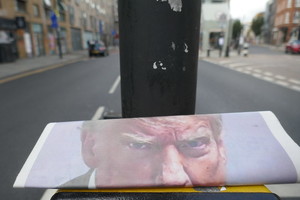How AP Stylebook Shows Bias in Climate Change, Climate Crisis Guidance

The Associated Press Stylebook recently showed left-leaning media bias by allowing journalists to use the term “climate crisis” in news coverage.
In a Stylebook entry guiding journalists on how to use the terms climate change and climate crisis, AP writes: “The term climate crisis, used by the United Nations and others, may be used when describing the current situation. But use the term sparingly, and provide specifics as much as possible.”
In our Media Bias Audits of newsrooms, AllSides recommends avoiding polarizing terms such as “climate crisis,” a term typically embraced much more by sources on the left. Recent AllSides analysis has found it’s rare to see an outlet on the right use the term “climate crisis,” which makes this term a good example of word choice bias.
RELATED: “Climate Change” vs. “Global Warming”: What Do Left and Right Media Report?
AP’s Stylebook guidelines on climate change and climate crisis reinforced a trend of Lean Left bias in this news outlet.
The Associated Press (Lean Left bias) was once a bastion of objective journalism and considered the gold standard for journalistic practice for over 100 years. Stylebook guidelines have historically been used not just by AP journalists, but by all journalists seeking to make objective and fair choices in news reporting.
AllSides rated AP Center for years, but multiple bias reviews by panels of experts and Blind Bias surveys taken by thousands of readers show Americans on average now see Associated Press news content as leaning left.
RELATED: What the Term “Climate Change” Means to Liberals and Conservatives
AllSides has written about bias concerns with AP and its Stylebook before, including when it opted to capitalize the racial signifier black and not white, when it deemed the term “the French” as “dehumanizing,” and when it took a one-sided approach to transgender guidelines.
The term “climate crisis” conveys a sense of urgency around the issue of climate change. This underscores a belief that climate change must be acted upon quickly— often via government policies — the necessity and impact of which are widely disputed amongst voices on the left and right. By using this term in what is meant to be objective new reports, journalists align with left-wing rhetoric on the issue.
More than half — 54% — of Republicans say they strongly or somewhat support the U.S. participating in international efforts to help reduce the effects of global climate change, but they tend to use different word choices around the issue and don’t elevate climate change to the level of “crisis.”
RELATED: Media Bias Alert: AP Omits Other Side in Transgender Style Guidelines
Word choice bias is a type of media bias in which a word or phrase reveals an underlying political ideology. For example, a liberal journalist who believes America should accept more immigrants may use the term “undocumented immigrants,” a term intended to avoid dehumanizing the individuals in question, while a conservative journalist who believes borders should be more closed may use the term “illegal immigrant,” which highlights the illegality of the act. (AllSides uses the term “unauthorized immigrants.”) Word choice bias is common in media coverage surrounding many issues, such as abortion, guns, and gender issues.
AP's cautioning to journalists to use the term sparingly signals it knows on some level that the term conveys some partisan leanings.
AllSides has written before about how outlets on the right are more likely to cover voices that dissent from the mainstream view on climate change, including those who convey the belief that while the planet is warming, it may be a natural process and/or not catastrophic.
Right-rated media outlets are more likely to label the left’s view of climate change and associated policy prescriptions as “climate alarmism.” Searches for the term “climate alarmism” on multiple Lean Right and Right-rated news sites, such as Fox News (Right bias), The Epoch Times (Lean Right bias), Daily Signal (Right bias), and National Review (Right bias), show many headlines using this term. Similar searches on Lean Left and Left-rated outlets, including The New York Times (Lean Left bias), Washington Post (Lean Left bias), CNN (Lean Left bias), and USA Today (Lean Left bias) show these outlets almost never use this term in headlines.
RELATED: AP Stylebook Accused of Bias for Deeming Term 'the French' as 'Dehumanizing'
Below are a few examples of right-wing commentators using the term “climate alarmism”:
Meanwhile, here are a few examples of how left-wing commentators use the term “climate crisis” in headlines:
AllSides has kept a close eye on the Associated Press for years because of its colossal reach and impact worldwide. As a wire service, AP fills gaps in news coverage for local and national media outlets around the globe; as such, its reporting standards affect the worldview of millions of people. AP states that it sends content “to over 3,000 U.S. sites and 900 international sites, with support for 23 languages.” AP also states that for over 175 years, its standard has been to “ensure that the news was reported quickly, accurately and factually, in a balanced and unbiased way.”
AP Stylebook guidelines have historically been very important because they set a standard for objectivity and the handling of contentious issues in a way that did not reveal bias on the part of the journalist. But in recent years, AP has earned attention from a swath of voices that see its choices as slanted — including AllSides.
To truly commit to unbiased news, AP should ensure its Stylebook standards do not inadvertently align with one side on contentious issues. Reader trust depends on it.
Julie Mastrine is the Director of Marketing and Media Bias Ratings at AllSides. She has a Lean Right bias.
This piece was reviewed by Joseph Ratliff, AllSides Content Designer and News Editor (Lean Left bias), and Andy Gorel, News Editor and Bias Analyst (Center bias).

April 29th, 2024

April 29th, 2024

April 26th, 2024

April 25th, 2024